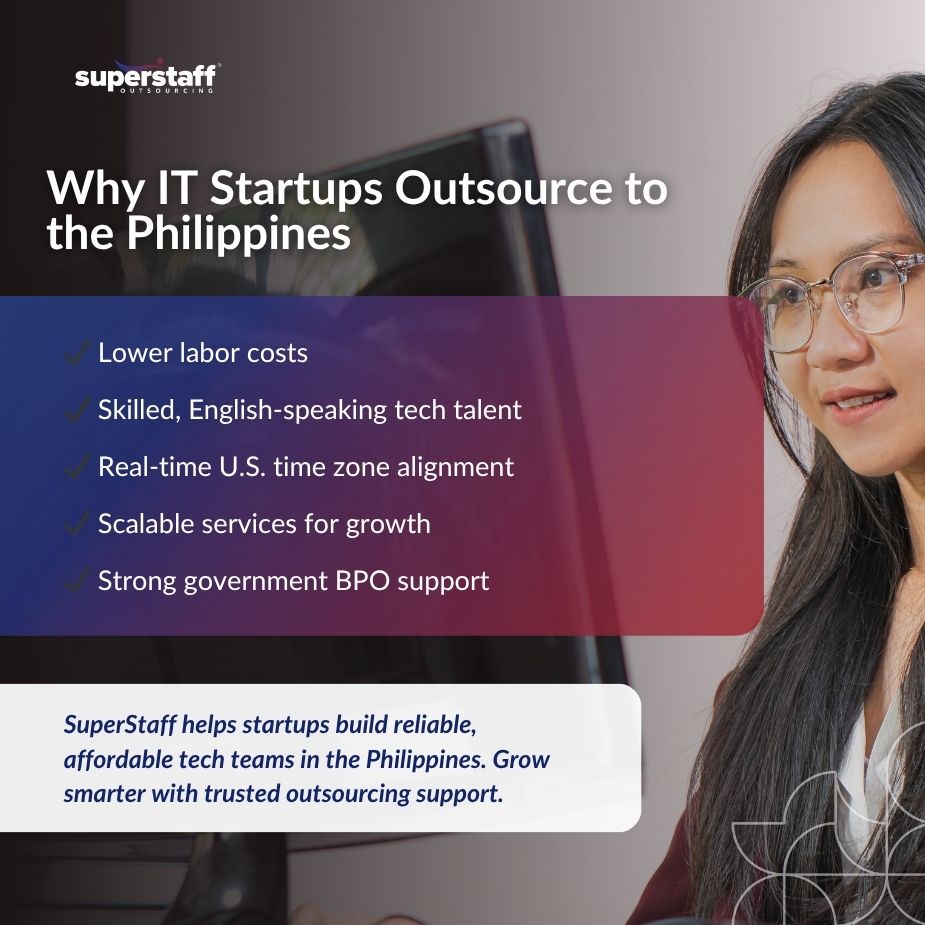
IT startups often begin with tight budgets, small teams, and big goals. With limited resources, they must move fast while keeping operations lean. One way startups manage this balance is to outsource IT to the Philippines. It helps reduce costs, expand capabilities, and stay focused on product development.
The move to outsource is not new, but the Philippines is becoming the preferred destination for startups that need reliable technical support, software development, or data management services. Known for its English-speaking talent, strong tech capabilities, and time zone alignment with U.S. companies, the country offers practical solutions that match startup needs. Here is a closer look at why more IT startups are quietly making this strategic move.

What Makes Startups Outsource IT to the Philippines
The Philippines offers several advantages for startups seeking to stay lean while building robust tech teams. These reasons explain the growing trend to outsource IT to the Philippines.
1. The Philippines offers lower labor costs without compromising service quality.
Hiring full-time developers, support agents, or engineers in-house can be expensive for a startup. In the Philippines, startups can build teams at a much lower cost. This helps them manage expenses while maintaining performance and makes it easier to invest in core business areas like product development and marketing.
2. The country has a large pool of skilled IT professionals.
The Philippines produces thousands of IT graduates every year. Many are trained in coding, database management, cloud services, and software support. Startups looking for reliable technical talent can find professionals with the exact skills needed to complete time-sensitive projects or ongoing tech support tasks.
3. English proficiency supports seamless collaboration.
One of the reasons why IT startups outsource to the Philippines is the country’s strong English communication skills. From writing reports to daily meetings, Philippine-based teams can communicate clearly with U.S. and global clients. This reduces the risk of misunderstanding and delays.
4. Time zone alignment supports real-time operations.
Many IT startups need teams that can work in sync with their in-house staff. The Philippines shares overlapping hours with the U.S. This allows for same-day updates, fast responses, and real-time support when needed. This is a key factor when choosing between the Philippines and other offshore options.
5. There is strong cultural compatibility with Western markets.
Startups value clear communication and shared business practices. Filipino professionals are familiar with Western work styles, expectations, and customer service standards. This helps build better working relationships and supports smooth day-to-day operations.
How the Philippines Compares to Other BPO Destinations
While there are other outsourcing hubs around the world, such as India, Vietnam, and Eastern Europe, the Philippines stands out in several important ways.
1. Language fluency makes project communication easier.
Countries like India and Vietnam offer strong technical skills, but the Philippines often provides a better mix of language fluency and tech expertise. This is especially helpful for startups that need both development work and customer-facing support.
2. The total cost of services is competitive.
When startups outsource IT to the Philippines, they benefit from competitive pricing across different roles. These include developers, QA testers, and help desk agents. The overall value is often better compared to Eastern Europe or Latin America, where labor costs are rising.
3. Infrastructure and government support boost business stability.
The Philippine government supports the BPO industry through tax incentives, training programs, and IT parks with strong internet and power infrastructure. This reduces business risks and ensures service reliability for clients.
Common IT Functions Startups Outsource to the Philippines
Startups do not have to outsource everything at once. Many begin with one function and expand as they grow. The following are common services that startups entrust to Philippine-based teams.
1. Software development helps speed up product timelines.
Startups need to develop apps, websites, and internal systems quickly. Philippine developers work on front-end and back-end solutions. They often contribute to product launches and feature updates while reducing the burden on in-house teams.
2. Technical support provides ongoing service to users.
Startups with live products often receive user tickets or technical issues that require prompt attention. Outsourced teams in the Philippines can provide round-the-clock support, especially when startups are not ready to hire a full internal help desk.
3. Data services improve accuracy and workflow.
Startups handle a lot of data, especially in early growth. Teams in the Philippines can support data entry, processing, migration, and database maintenance. This helps improve accuracy without draining in-house resources.
4. UI/UX design enhances the product experience.
Some startups also outsource IT design tasks to the Philippines. UI/UX professionals in the country provide mockups, wireframes, and design support that improve app usability and customer experience.
5. Quality assurance ensures software is working as expected.
Testing and bug tracking are essential, but they can be time-consuming. QA specialists in the Philippines can take on these tasks and help deliver more reliable products to users.
Steps to Build a Smart Outsourcing Model
To gain long-term value from outsourcing, startups must build a clear and structured setup. The following steps can help create a successful outsourcing arrangement with a team in the Philippines.
1. Define your outsourcing goals based on current business needs.
Start by identifying which IT functions you want to outsource. These could include development work, support services, or project-based needs. Clear goals help service providers deliver exactly what is expected.
2. Choose a BPO provider that understands startups.
Not all outsourcing partners are suited for fast-moving startup environments. Look for a provider with experience working with small, growing companies. A good provider should be able to adapt as your business changes.
3. Launch with a pilot team before scaling up.
Start small with a few team members or one project. This lets you evaluate performance, communication, and workflow before committing to a large operation.
4. Set up regular check-ins and project updates.
Use communication tools and set a consistent reporting schedule. Weekly meetings, progress reports, and ticket systems keep your team and provider aligned on priorities and expectations.
5. Monitor results and make improvements over time.
Track key metrics such as resolution time, delivery rate, or error reduction. Use these results to improve processes or decide when to expand your team.
Why Startups Are Quietly Making the Move
Many startups choose not to promote their outsourcing strategies publicly. This quiet approach is often intentional and strategic.
1. They want to protect their competitive advantage.
Outsourcing allows startups to operate lean and fast. By keeping this strategy private, companies avoid tipping off competitors who might copy their model.
2. They are cautious about how outsourcing affects brand image.
Some companies worry that outsourcing might raise concerns with users, investors, or media. Quiet implementation allows them to monitor quality and results before making public announcements.
3. They prefer to test before committing.
Startups often try outsourcing through a short-term pilot or contract. Keeping the setup low-profile gives them time to evaluate and improve the process before expanding it.
Tech Startup Growth Powered by Philippine Talent
Choosing to outsource IT to the Philippines is a practical decision for startups that need reliable, affordable, and scalable tech support. The country offers everything startups need to build strong operations without overextending their resources. From English-speaking developers to skilled support agents and flexible contract terms, the benefits are clear.
SuperStaff helps startups outsource smarter by offering Philippine-based teams built for flexibility and performance. Whether you need to launch your app, support your users, or manage your data, our team is ready to support your goals. With scalable delivery models, clear communication, and trusted experience, SuperStaff helps tech startups grow efficiently, one smart step at a time.






